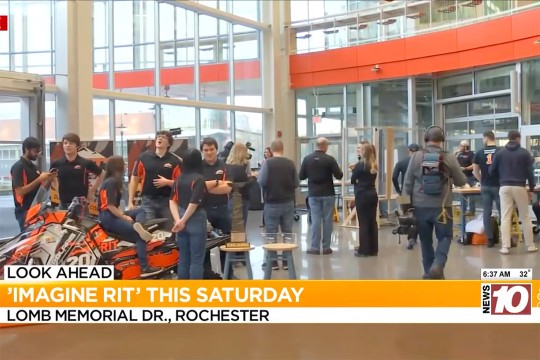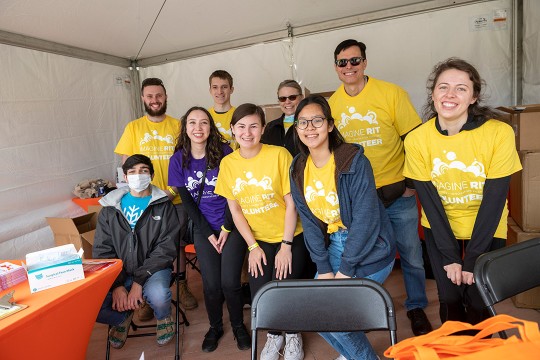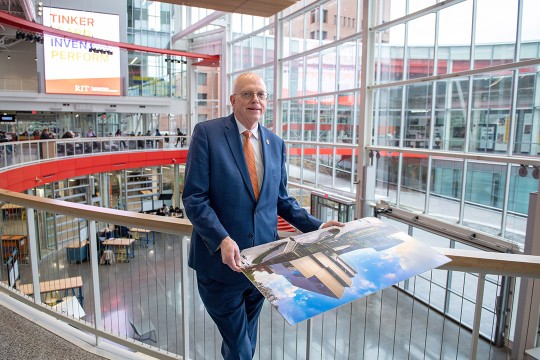RIT Lecture Series Exploring the Ethics of Biotechnology Begins Sept. 30
Rochester Institute of Technology's lecture series, Biotechnology: Our Future as Human Beings and Citizens, will feature six prominent scholars who represent a wide range of positions in the debate over biotechnology. They will explore the challenge and promises this technological revolution poses for self-government, for individuals' understanding of liberty and equality, and notions of humanity, virtue and citizenship.
“RIT has assembled a line-up of outstanding natural science and social science scholars to address the range of issues facing biotechnology,” says John Murley, chair of political science in RIT's College of Liberal Arts. “This lecture series is perhaps the foremost public discussion of the medical and social ramifications of the advances in biotechnology to take place in this country to date.”
The free, public talks will be held at 7:30 p.m. in Ingle Auditorium in the Student Alumni Union on the RIT campus, and will include:
- “The Role of Genomics in Drug Discovery,” by William Haseltine on Thursday, Sept. 30. Haseltine, chair of the board of directors and chief executive officer of Human Genome Science Inc., holds a doctorate from Harvard University in biophysics and was formerly a professor at Dana-Farber Public Cancer Institute at the Harvard Medical School and Harvard School of Public Health. Since 1981, he has founded seven biotechnology firms.
- “Who's Afraid of Posthumanity? A Look at the Growing Left/Right Opposition to Biotechnical Progress,” by Ron Bailey on Thursday, Oct. 14. Bailey, the science correspondent for Reason magazine, edited Earth Report 2000: Revisiting the True State of the Planet, and wrote ECOSCAM: The False Prophets of Ecological Apocalypse.
- “Future Biotechnologies: The Governance Challenge,” by Francis Fukuyama on Thursday, Dec. 9. Fukuyama, dean of Johns Hopkins University Center for International Studies in Washington, D.C., is a member of the President's Council on Bioethics and the author of several books, including Our Posthuman Future: Consequences of the Biotechnology Revolution.
- “Challenging Mother Nature: Biotechnology in a Spiritual World,” by Lee Silver on Thursday, Jan. 13. Silver is a professor of molecular biology at Princeton University and a member of Princeton's Woodrow Wilson School of Public and International Affairs. His book, Remaking Eden: How Genetic Engineering and Cloning Will Transform the American Family, has been published in 15 languages.
- “Nihilism and Human Nature in Biotechnology,” by Larry Arnhart on Thursday, March 24. Arnhart, professor of political science at Northern Illinois University, is the associate editor for Ethics and Biotechnology and Bioengineering for The Encyclopedia of Science, Technology and Ethics. His most recent book is the highly acclaimed, Darwinian Natural Right: The Biological Ethics of Human Nature.
- “Biotechnology and Our Human Future: Some General Reflections,” by Leon Kass, M.D., on April 21. Kass, is professor in the Committee on Social Thought at the University of Chicago and Hertog Fellow in Social Thought at the American Enterprise Institute. Kass chairs the President's Council on Bioethics. His most recent book is The Beginning of Wisdom: Reading Genesis.
The lecture series is co-sponsored by RIT and the New York Council for the Humanities. For more information about the lecture series, contact John Murley at 585-475-2064 or jamgcj@rit.edu or Sean Sutton at 585-475-4620 or sdsgsm@rit.edu.














